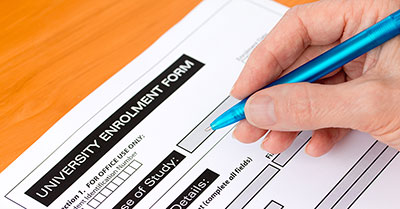Study Abroad Checklist
Do you plan to study abroad but don't know where to start? In this article we list everything you should do step by step to be well prepared for your studies abroad.
1. What do you want to achieve?
To be successful in something you must know what you want to achieve. Why do you want to study abroad? The answer to this question will have a big impact on the choices you should do in the following steps. Let me give you a couple of examples.
If your main goal is to experience living in Paris then your best option is probably to study at a French language school there. Learning French is the key to getting the most out of a stay in France and a normal course at a language school is often less demanding than University studies which leaves you plenty of time to explore the city.
If on the other hand your main goal is to become a designer then you should choose to study at the best possible school that you can afford and be accepted to. Maybe that means giving up studying in Paris if you find other options that suits you better elsewhere. After all if your goal is to become a designer you should make a choice that gives you the best possibilities to achieve that goal.
Read more in our article Six reasons to Study Abroad.
2. Find the right school
Once you know what you want to achieve it is time to look for suitable schools. By now you should know what kind of school you are looking for. But there are thousands of schools to choose from, how do you pick the right one? The answer to this question depends on who you are, there is no school that is right for everyone. What is most important for you? Price, facilities, location, courses, admission procedure? All these things matters and you need to figure out what is most important for you. Then you can narrow the choice down to a few schools.
The next step is to have a closer look at your shortlisted schools. What are their pros and cons? What do students say about them? Read reviews but don’t trust them completely, remember that the reviewer isn’t you. If someone complains that the tempo was too high at a certain school then this was a bad thing for them but it can actually be a good thing for you if you are a dedicated student who wants to learn as much as possible in a short period of time.
You can search for schools all over the world in our international school database and read more in our article on how to find and choose a school abroad.
We can help you to find the right school and program in many countries. Fill in an information request so we can help you!
3. Go on your own or through an organization
There are three main paths that you can take to study abroad:
- Take an exchange semester through your current school. This can be a great option if your school has exchange agreements. Then they can arrange for you to study at one of their partner schools abroad under the same conditions as you study at your ordinary school. The drawback is that choices are limited and that there is usually not enough places for everyone who wants to attend.
- Go through an agency. Study abroad agencies can help you to apply to schools abroad and prepare you for your studies abroad. The drawback is that an agency can only help you study at schools they have agreements with and there will always be a tuition fee. Agents can be a great choice if they offer a school that you are interested in and if they don’t charge any extra costs. Otherwise you have to decide if you are willing to pay for the extra help.
- Arrange everything yourself. If you want to be able to choose any school in the world and don’t want to pay anything extra then your best bet is to arrange everything yourself. It will take some work but it can also be a great experience. Follow this checklist and check out other parts of this website to help you along. You can also read our country guides about studying in the US, studying in the UK, studying in the UK, studying in Australia and study in Japan if you are interested in those countries.
4. Apply
Your application will decide whether you will be accepted at your chosen school or not so prepare it carefully and make sure to submit all the requested information. For language schools and many colleges it is usually quite easy to get accepted as long as you fulfill the minimum requirements so. However if you apply for a prestigious university it can be more challenging to become accepted and you might need to improve your grades at home first. Read more in our articles how do I apply to universities abroad and do I need good grades to study abroad?
We and our partners can help you with the application to schools in many countries. Fill in an information request for more information.
5. Financing, budget and scholarships
There is usually a tuition fee when you study abroad. I recommend that you make a budget where you add together your expected costs for tuition, course materials, accommodation, flight, visa and estimated living expenses. Do you have enough money to get by? If not you should probably look for less costly alternatives. Working or applying for scholarships can be ways to increase your budget but remember that there is no guarantee that you will get a job or scholarship at your preferred destination.
Read our artcle about how much does it cost to study abroad, scholarships for studying abroad and how you can study abroad for free. You can also apply for DreamStudies' study abroad scholarships worth 5000 Euro/year.
6. Student visa
When you study abroad you usually need a visa. The main exception is EU students studying in other EU countries. On short language courses it is sometimes allowed to study on a tourist visa but for almost all courses over three months a student visa is required. Make sure to check the visa regulations for the country that you want to study in. Without the right visa your study dream will be cut short already at the airport.
Usually you need to be accepted to a school before you can apply for a student visa. Once you are enrolled and have paid the necessary fees the school should provide you with the documents you need to apply for a student visa.
Read more on our page about student visas.
7. Student housing
To enjoy your studies abroad it is important that you find a good place to live. Many schools have their own accommodation that you can book through them. If you prefer to arrange your own accommodation the best solution is often to book some temporary accommodation to begin with and then find a more permanent solution once you are at the location and can check it out in person.
We can currently help you with student housing in Japan, accommodation in Korea, and student accommodation in many other countries like the US, UK, Australia, Spain, Germany, France etc through our accommodation partner Uhomes.
Read more in our article about student housing when studying abroad.
8. Student insurance
Studying abroad can be a real adventure. Make sure to stay safe by having a good study abroad insurance. Soon we will present you with more information about student insurances.
Read more on our page about insurances for studying abroad.
9. Packing
Don’t forget your passport, visa and enrollment documents. Adapters, chargers and some local currency are other important things to bring. For more information see our packing list for studying abroad.
10. The trip to your place of study
Time to book your flight and get on the way! Nowadays the cheapest option is usually to book on your own online. Just make sure to choose the right arrival airport. You can often get cheaper tickets if you are willing to accept a long flight time with several stops.
More information
DreamStudies are here to help you! Fill out an information request if you want to get in touch with suitable schools in a specific country. Don’t hesitate to ask us if you have any questions about studying abroad. We always help you free of charge!
Follow @dreamstudiesabroad on Facebook, Instagram, Tiktok, or Youtube to get updated about our new schools and articles.





















